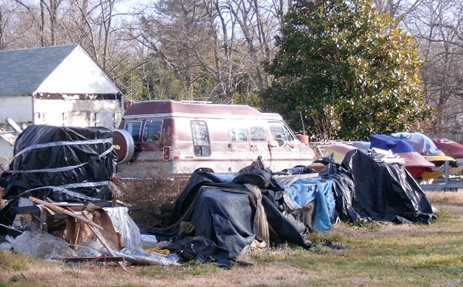In the I-2 District, the storage and display of goods must be inside a completely enclosed building, except for outdoor seating associated with a restaurant.
For most uses in the C-5 through C-8 Districts as well as the I-3 and I-4 Districts, up to 500 square feet of outdoor storage or display of goods may be permitted depending on the use standards for those districts and any proffered condition or similar zoning approval. Storage and loading in these districts must be screened from view from the first story of any buildings on abutting lots and from rights-of-way. Additional square footage of outdoor storage or display may be allowed for a contractor’s office and shop use; a storage yard use; and/or with a development plan, site plan, and/or special exception approval, depending on the use and the zoning district in which it is located.
Important note for contractor’s office and shops, such as construction and landscaping contractors: In the C-8 District, there may be no outdoor storage or outdoor parking of heavy vehicles and equipment (such as solid waste collection vehicles, dump trucks, cement mixers, tractors, or trailers of tractor-trailer trucks) unless a special exception is approved by the Board of Supervisors.
In I-3, I-4, I-5 and I-6 Districts, light vehicles and equipment and heavy vehicles and equipment can be stored outside. As for all sites and uses, site plan and Nonresidential Use Permit (NonRUP) approval is required.
The Zoning Permit Section in the Department of Planning and Development should be consulted to review additional permissions and limitations. Wondering about how your property is zoned? This information and more about your property can be found on the county’s real estate assessment site.


